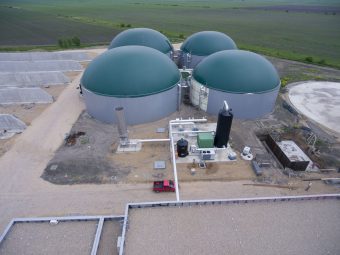
Unlike fossil fuels, biogas is a permanently renewable fuel, since it is produced from biomass. The use of biogas helps to improve the country’s energy balance and contributes to the conservation of natural resources and environmental protection.
Biogas is a very flexible fuel, and it can be used for the production of thermal energy, the combined production of electricity and thermal energy (in a cogeneration plant) or combined production of electrical, thermal and cooling energy (trigeneration). Since this edition is dedicated to clean energy, we have decided to find out what is happening in the domestic biogas market.
Although we know that this fuel is not sufficiently present in our country and that its potential is greater than the current use, we asked Danko Vukovic, Chairman of the Managing Board of the “Biogas,” Association about the possibilities for the development of the biogas sector in our country. He explained to us how this non-governmental and non-profit association operates and what are their plans for the future.
EP :“Biogas” Association was founded in 2012 with the aim of developing and stimulating electricity production from biogas. Are you satisfied with the results you have achieved so far?
Danko Vukovic: In 2013, shortly after our establishment, a regulation was passed that practically stopped the development of biogas in Serbia. We have made a study in cooperation with the IFC – World Bank, of the conditions for improving the development of the biogas sector, the arguments of which were also acknowledged by the Ministry of Energy. Precisely these arguments they added to the decree. The passing of the regulation from 2016, which is currently in force, is considered one of our greatest successes. This regulation contributed to the accelerated development of the biogas sector in Serbia.Our association is continuously working on the improvement of the conditions for the development of the biogas sector, and we are constantly in communication with relevant ministries to achieve the set goals.
EP: Who are the members and partners of your association and what kind of support do you provide to your members?
Danko Vukovic: Our association currently has 32 members, and its structure is made up of the owners of power plants, potential investors, academic institutions, and others. The Association regularly organizes panels, seminars, workshops, and practical training. In addition to the educational or informational aspect of our engagement, we are available to our members for advice, as well as for help with communication with relevant ministries, and above all the Ministry of Energy.
EP: Does the Ministry rely on your expertise for passing the laws and by-laws, and what type of assistance can you expect from them?
Danko Vukovic: We have excellent cooperation with the Ministry of Energy at all levels, and we always try to be objective in all positions, but also to support these views by independent analysis that we make in partnership with the IFC – the World Bank. So far, the Ministry has respected our views and recommendations, and we believe that this will continue in the future.

EP: Given that people often do not differentiate biomass power plants from those on biogas, could you explain to us their characteristics?
Danko Vukovic: Although both types of power plants use biomass as the “fuel,” the key difference is in the method of operation or the process of electricity generation. In the case of biomass plants (wood, waste, etc.), the substrate combusts and heats the water, and then the water vapour starts up the gas turbine. When it comes to biogas plants, the substrate such as silage, waste from food production or manure, is decomposed into large containers – fermentors at a precisely determined temperature, from which biogas derives as a by-product of the decomposition of organic matter. It contains a high percentage of methane and is further used in conventional internal combustion engines which in this way starts up the generator for generating electricity.
EP: About 21 per cent of annual energy in Serbia comes from renewable sources. What is the share of biogas?
Danko Vukovic: If we consider all renewable energy sources, including large hydropower plants like Djerdap, the energy share of biogas in RES is negligible because it is only 0.8 per cent. However, if we only consider the RES that are part of the incentive measures, the share of biogas is 11 per cent.
Prepered by: Nevena Đukic
Read the whole interview in the new issue of the Energy portal Magazine on CLEAN ENERGY, December 2018. – February 2019.



